- Home
- Joan Lowery Nixon
Playing for Keeps
Playing for Keeps Read online
Table of Contents
Title Page
PROLOGUE
Chapter 1
Chapter 2
Chapter 3
Chapter 4
Chapter 5
Chapter 6
Chapter 7
Chapter 8
Chapter 9
Chapter 10
Chapter 11
Chapter 12
Chapter 13
Chapter 14
About the Author
ALSO AVAILABLE IN LAUREL-LEAF BOOKS
Copyright Page
“Be very silent,” Ricky whispered. “Someone is down here with us.”
I could hear the slow, heavy footsteps coming closer. Now and then they paused, as if the person had stopped to look around. After each pause they moved on, coming closer and closer.
It could not be one of the crew who worked here. A seaman would attend to whatever business he had and be gone. The person who was stalking us was probably as unfamiliar with the hold as we were.
Who was he? And why was he hunting for us? I was so frightened I wanted to scream and run, but I couldn’t move.
PROLOGUE
ENRIQUE HUDDLED IN THE BOTTOM OF THE SMALL BOAT, as Raúl had warned him to do.
Where is Raúl?
With only a thin cat’s smile of a moon to break the heavy blackness of the night sky, it was difficult to see, and the water against the pier muffled the voices outside the nearby cantina.
Raúl? Where are you?
Could Raúl have been stopped by the policía? What if he’d been cornered and had babbled about the escape, and the policía were about to storm across the beach? Enrique’s hands were sticky with sweat, and he wiped them down the sides of his khaki trousers. He knew what would happen. He’d be dragged from the boat and taken back to Havana.
Enrique’s rapid heartbeat thudded in his ears. He’d been warned about the fate of those who had tried to flee Cuba and failed. Some were beaten, starved in prison . . . In his own case he’d be branded a defector—as much a traitor to his country as if he’d deserted the military. The penalty for this crime against the state could be death.
Suddenly a large, dark mass loomed over the side of the boat, and Enrique choked noisily on his own fear.
“¡Silencio!” Raúl’s whisper was more of a deep rumble. “Do you want everyone from the cantina to hear you?”
Enrique felt the boat being shoved from the dock. The motor caught, and the boat headed for the pass between the Camagüey islands.
Raising his head and squinting to make out Raúl’s features in the darkness, Enrique asked, “Aren’t you going to use lights?”
“I don’t need lights,” Raúl said.
“But how can you see to read your compass?”
“I don’t need a compass. I know these waters, and they know me. They show me the way. I’m the best boatman in Cuba. That’s why your uncle hired me to take you to Haiti.”
“My great-uncle,” Enrique corrected.
“No importa.” Raúl’s chuckle was one of delight. “Eight thousand dollars makes me a very rich man,” he said.
So that is what Uncle Martín had to pay. Enrique wrapped his arms across his chest, rubbing his shoulders as if they were cold. This was only part of the price of freedom. How could he ever repay Uncle Martín?
The boat suddenly picked up speed, and Ricky sat upright, trying to discover what was happening without asking Raúl. The white beaches of Cayo Coco seemed to catch the thin light, reflecting it against the froth of breaking waves along the eastern shore. To the far north the lighted windows in a new hotel shone in a tidy grid, but before Enrique had time to think about what he had seen, the lights and the glowing sand had disappeared like a mirage.
The gentle waters of the bay changed to rough swells, and the little boat slapped the rises hard, sometimes plunging down and up again with a sickening jerking motion. Enrique clung to the sides of the boat, fighting the bile that rose in his throat. “Where are the life jackets?” he managed to ask.
Raúl laughed, this time making no attempt to be quiet. “No life jackets, no overhead. It seems that the star baseball player is not so good a sailor,” he said.
Enrique didn’t try to answer. He sucked in the cool air, feeling better as it stung his face.
He realized that Raúl didn’t expect him to speak. Raúl seemed more interested in himself. “I watched you just last week when you stood on the pitcher’s mound in the Estadio Latinoamericano and received a special award from Fidel Castro himself. You have a strong arm for one only seventeen years old.”
“No importa.” Enrique tried not to listen, but Raúl went on.
“In his speech Fidel said many extravagant things about your future.”
“No importa,” Enrique repeated.
Raúl’s voice rose with exaggerated incredulity. “ ¡No importa? When everyone in the Cuban league knows both you and your record? When you pitch a shutout game for the Habana Leónes? When Fidel himself puts an arm about your shoulders and proclaims himself your special patron? How can that not matter?”
Enrique could only groan.
Raúl was silent for a few minutes. Then he said, “I know your grandmother. Sometimes when I am in Old Havana I pass your house in the late afternoon and see Beatriz on the front porch. Back and forth she rocks, always smoking a fat cigar. I wave, and she waves back. She and my father were among Fidel’s young revolutionaries.”
“I know,” Enrique answered quickly, hoping it would stop Raúl from reminiscing. Much as he loved his stern grandmother, with her back as straight as the upright posts on a kitchen chair and her voice as sharp as the click of a knife on a plastic breadboard, he had heard Abuela Beatriz speak much too often about Fidel Castro’s glorious rise to power.
Raúl broke into Enrique’s thoughts. “My father often told me that back in the fifties, when Beatriz fought with Fidel’s forces, she was as tall and strong as any man. She did not brag about her family’s Spanish blood and their privileged life under the protection of the dictator Batista. She was proud to be Cuban. She followed Fidel’s star then, and I hear she is still as loyal as ever.”
“Yes. She is,” Enrique answered.
Raúl’s words curled with sly curiosity through the darkness. “So how does she feel about you deserting Cuba?”
“I am not deserting Cuba!” Enrique insisted. Tears burned his eyes as he thought of leaving the land he loved, the grandmother he loved, and especially the one he loved best, his great-aunt Ana.
Although Beatriz had become Enrique’s guardian after his parents were killed in a factory fire, it was her sister—gentle Ana—who rocked Enrique and sang to him and played games with him and cooked his favorite fried bananas and sweet milk pudding as special treats. It was Ana who taught Enrique to throw a baseball when he was only five, and later took him to audition for the baseball academy, where he would get the best education on the island.
“You’re like your great-uncle Martín,” Ana would say, and she’d tell Enrique about her brother-in-law who had played with the Cuban league until Fidel Castro’s rise to power, when Martín had left Cuba for the United States and signed with the Cincinnati Reds.
“Martín left to find freedom,” she’d say, and the words, as she spoke them, rang like small silver bells in Enrique’s mind.
When Enrique grew older, able to see how Fidel’s dictatorship was harming the Cuban people, he understood what Tía Ana’s words really meant. They were more than words. They were more than silver bells. The search for freedom became the very heart of life.
It was Tía Ana who had worked with Uncle Martín to make arrangements to help Enrique escape to the United States, where he could ask for political asylum
.
Eager to be through this first leg of his journey, Enrique asked, “How long until we reach Haiti?”
“Not long at all.”
“What if we meet a patrol boat?”
“This little boat of mine is so low in the water it is missed by the patrol boats’ radar,” Raúl answered. “Also, it is faster than any patrol boat ever built. I have been chased more than once, but I easily outrun them. That is why people headed for Florida or the Bahamian islands hire me. That is why your uncle hired me. Never fear, young baseball star, your uncle’s plan is not what I expected, but as he wishes, I will bring you to Haiti and to the people who will help you.”
Enrique nodded; then, realizing that Raúl would not see that nod, he quietly said, “Gracias.”
“No need for thanks,” Raúl said, and laughed again—a laugh Enrique was beginning to hate. “The payment I was given is thanks enough.”
Nothing more was said. Enrique, concerned only with his balance as the boat skimmed and slapped the surface of the ocean waters, lost all track of time. All he knew was that the night was still deep velvet—as Tía Ana used to call it—indicating the late night hours.
When they reached the island of Haiti, its shoreline was only a dark, forested blur to Enrique, but Raúl, unerring as a bat in the darkness, headed into a small inlet and docked at a rough pier.
“This way,” called a soft voice in the darkness.
Obeying the words in English—a language Tía Ana had taught him well—Enrique struggled to his feet and climbed from the boat. He staggered a few steps as his body tried to adjust from the choppy waters to the stability of land, and then a hand gripped his arm.
A boy, a shadow in the dark night, looked up at Enrique, saying, “You be okay now. Come with me.”
Enrique could hear Raúl’s boat already moving back out to sea and realized he was alone in a strange land with a boy younger than himself— thirteen? Fourteen?—whom he was entrusting with his life. “Who are you?” Enrique asked.
The boy hesitated, then said, “Call me Paki.” Quickly he added, “Come along now. I give you a mat for a few hours’ sleep. Then before light we go to Bonita Beach. Okay?”
Bonita Beach. Where I’ll meet my uncle. “Okay,” Enrique answered. He followed Paki past a line of beached canoes and rowboats to a cluster of makeshift houses in a clearing. Without turning on a light, the boy led Enrique inside one of the dwellings. Pointing to three dark bundles, one of which snored lightly, he whispered, “Don’t step on my brothers.”
Enrique was given a padded cotton mat, which he unrolled and spread across the only available floor space. He wearily lay on the mat, knowing he’d never be able to sleep. He was defying fate and creating deadly political enemies in the process. He was alienating his grandmother. He was parting forever from his beloved Tía Ana. He was headed for freedom in a strange country with a great-uncle he knew only from occasional letters. How could he sleep?
In spite of his worries, he must have. It seemed like only a few minutes later that he struggled to wake from fearful dreams and to pull away from the hands that gripped his shoulders in the darkness.
“Time to go now. Wake up!” Paki’s voice was urgent. He thrust a wide-brimmed straw hat at Enrique. “Wear this and come. We got no time to lose!”
Enrique hurried, stumbling after the boy. By the time they reached the inlet, a cluster of long, narrow canoes and rowboats crowded the water. Some of them were already filled and heading out to sea.
Someone called out to Paki, who jumped into the nearest canoe. He motioned to Enrique to follow.
As the boat shot forward, propelled by two men with paddles who sat fore and aft, Paki leaned toward Enrique. “Only way to get to Bonita Beach be by water,” he said. “They take workers in early morning before ships come and pick them up at night, after ships leave. You got American dollar? You give to them. Okay?”
Enrique nodded. He had no Cuban pesos. They were worth nothing, even in Cuba, where the U.S. dollar was the currency of choice. Tía Ana had given him twenty U.S. dollar bills—the equivalent of a Cuban doctor’s monthly salary—to use, if needed, before he made his connection with her brother-in-law, Martín Urbino.
Paki grinned. “And maybe a dollar for me, too. Okay?”
“Okay,” Enrique said.
“You gimme now. I see they get paid.”
Enrique reached into the inside pocket of his jeans and tugged out three one-dollar bills. He passed them to Paki, who took them without a word.
The canoe trailed the small boats ahead, hugging the thickly overgrown shoreline. Branches covered in broad, fleshy leaves tangled with rough spikes of palm and fanlike leaves of sea grape, creating a tightly woven wall around the island. Enrique couldn’t imagine how anyone could penetrate it.
As they reached a peninsula with broad, sandy beaches and widely spaced shade trees, Enrique could see a man standing under a yellow lamp peering at a clipboard. Workers lined up before him, apparently giving their names, then trotted across the packed sand to tend to the jobs they were hired to do.
“Your white face be too different. Keep your head down. Let your hat cover you,” Paki whispered.
At one side of the area, between the curve of the bay and the thick growth that covered a steep hill, was a large open-sided pavilion surrounded by rows of picnic tables and benches. Chatter and laughter came from within the pavilion, where cooks must already have been preparing lunch, and Enrique’s stomach clutched with hunger. When had he last eaten? He couldn’t remember.
Paki laid a hand on Enrique’s shoulder and whispered, “Be ready now. When we land you move fast.”
“Where should I go?”
“The old fort. I show you.”
Their canoe shot around the beached ones, and the man with the clipboard raised his head. “Hey! Where you going?” he called.
“No room there, Mr. Dee,” the man in the prow shouted back. He swung the canoe inland around a curve, beyond the director’s line of sight.
“Now!” the boy said. He and the other men jumped from the canoe and waded the few steps to shore. Enrique followed.
While the men headed toward their check-in point, Paki scrambled up a low embankment, across a path through a thin scrub of forest, and through the broken doorway of what remained of a stone fort. Enrique stayed close behind.
“No one come here for a while,” Paki said. “Just stay away from the trail so no one can see you.”
“Where will I find my uncle?”
“No worry. He find you.”
“When will he come?”
Paki pointed to the open expanse of water. “Ship be here eight-thirty. You see.” He paused. “I go now.”
Enrique nodded. “Gracias. Thank you.”
Paki grinned again and was gone.
Enrique climbed into a sheltered corner among the roofless, broken walls of the small fort. He shivered, hugging his shoulders and rubbing his upper arms, but he couldn’t rid himself of the fear that dampened the back of his neck and burned with a sour taste in his mouth.
Martín Urbino had passed his dreams and hopes to Enrique, but how could they possibly come true? As Fidel Castro’s enemy, how could Enrique ever hope to escape?
1
I DIDN’T HAVE TIME TO THINK ABOUT MY ARGUMENT with Mom until Glory and I were in the air on the way to Miami. Then I had too much time.
Glory—Gloria Marstead—was my grandmother on my father’s side. Mom sometimes complained that Glory had a salt-and-pepper attitude to go with her salt-and-pepper hair and liked getting her own way.
I have to agree. In spite of the fact that Grandpa made a great deal of money way back during the oil boom and invested it wisely before he died, Glory had continued to work as a successful attorney until she retired a year earlier.
“Defending people gives her an excuse to argue,” I once heard Mom telling Dad. He thought what Mom said was funny. So did I. But Mom wasn’t trying to be funny.
In the s
eat beside me Glory gave a light snore. I glanced at her, expecting her to wake up, but she continued to sleep peacefully. We’d had to catch a very early plane at the Midland-Odessa airport to connect with our flight out of Houston. I was tired, too, but there was no way I could sleep—not after the argument, which had never been resolved.
I couldn’t help being excited about going with Glory on a week’s cruise in the Caribbean, but deep down inside I had a sick feeling. I should have made peace with Mom before I left. I had wanted to, but I didn’t know what to say or do, and Mom was so frozen in her own unhappiness I couldn’t begin to reach her, even if I’d known how. I wasn’t the only one at fault, I told myself. She had let me go without trying to break through that layer of ice.
The argument had started over a party I should never have gone to with a guy I hoped to totally forget.
“When you first saw what the party was like, Rose Ann, why didn’t you ask your date to take you home?” Mom had asked.
I’d blushed and stared down at the scuffed toes of my sneakers. “Cam Daly wasn’t . . . well, I found out that he only asked me to the party because a girl he likes was going to be there. Mom, he dumped me. I felt so stupid. I thought everybody was staring at me and thinking I was a real loser, so I tried to act like I was having a good time celebrating spring break and didn’t care.”
Mom had just sighed and asked, “Rose Ann, you need to act with maturity. Aren’t you ever going to stand up for what you believe in? Where is your courage?”
I’d groaned, knowing what was coming. “Are you going to bring up that time ages ago when Bobby Mac cheated from my test?”
“It wasn’t ages ago. It was last September. You allowed him to see your paper and got caught doing it. And what about when Lou drove all of you in her family’s car and you knew very well she didn’t have her license yet. Why didn’t you object?”
I’d slid another notch down on the sofa. “Do we have to go into all that again?”
“I’m trying to show you that it was the same situation with the party last night,” Mom had said. “Be independent. Don’t just go along with the crowd because of what somebody might think of you. Last night you abused my trust in you and the freedom I’ve given you.”

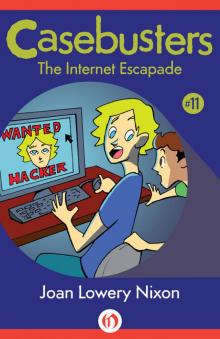 The Internet Escapade
The Internet Escapade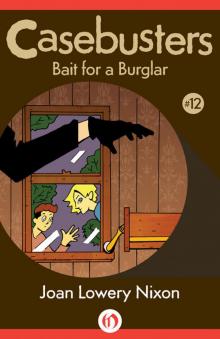 Bait for a Burglar
Bait for a Burglar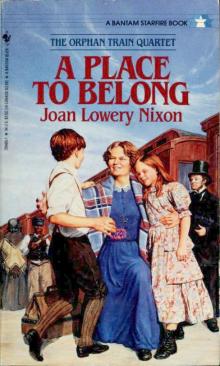 A Place to Belong
A Place to Belong Nightmare
Nightmare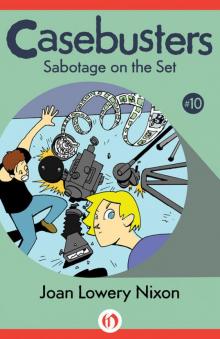 Sabotage on the Set
Sabotage on the Set The Other Side of Dark
The Other Side of Dark Whispers from the Dead
Whispers from the Dead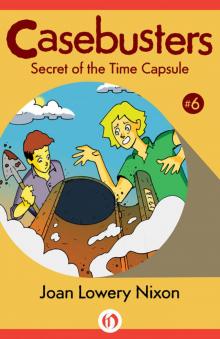 Secret of the Time Capsule
Secret of the Time Capsule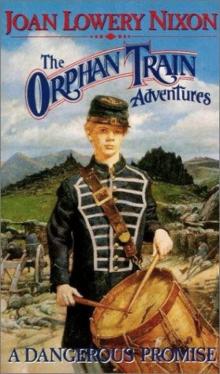 A Dangerous Promise
A Dangerous Promise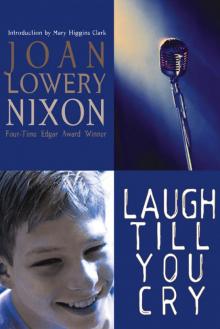 Laugh Till You Cry
Laugh Till You Cry Spirit Seeker
Spirit Seeker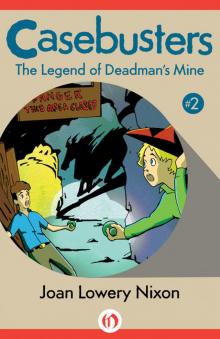 The Legend of Deadman's Mine
The Legend of Deadman's Mine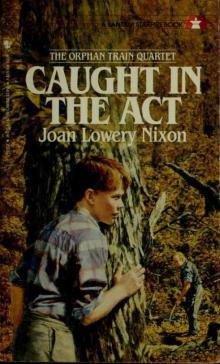 Caught in the Act
Caught in the Act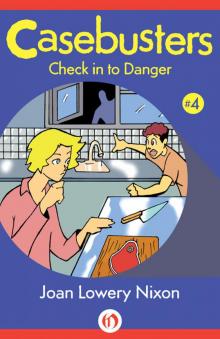 Check in to Danger
Check in to Danger Ellis Island: Three Novels
Ellis Island: Three Novels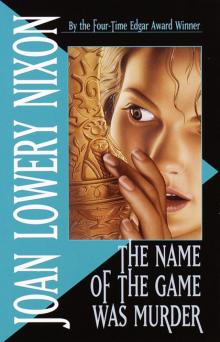 The Name of the Game Was Murder
The Name of the Game Was Murder The Haunting
The Haunting Lucy’s Wish
Lucy’s Wish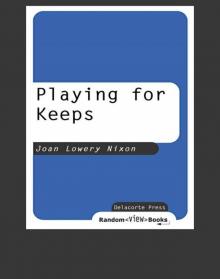 Playing for Keeps
Playing for Keeps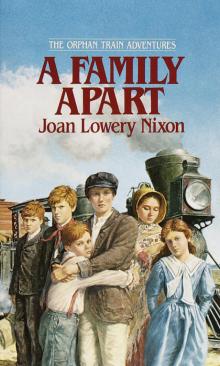 A Family Apart
A Family Apart Nobody's There
Nobody's There Shadowmaker
Shadowmaker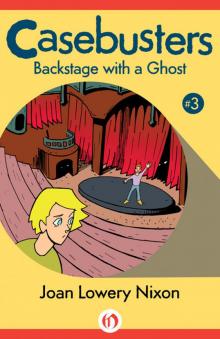 Backstage with a Ghost
Backstage with a Ghost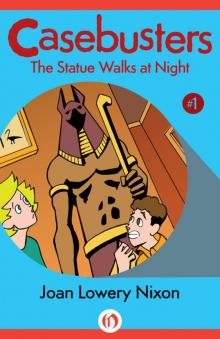 The Statue Walks at Night
The Statue Walks at Night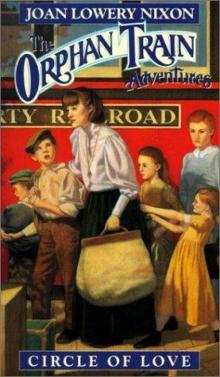 Circle of Love
Circle of Love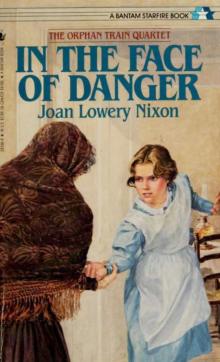 In the Face of Danger
In the Face of Danger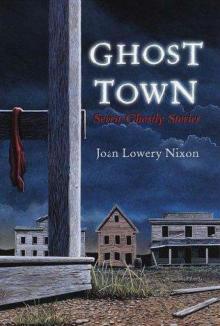 Ghost Town
Ghost Town A Candidate for Murder
A Candidate for Murder The Weekend Was Murder
The Weekend Was Murder The Island of Dangerous Dreams
The Island of Dangerous Dreams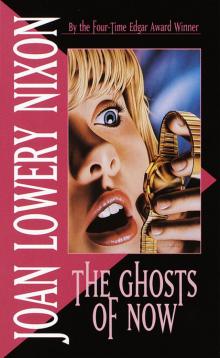 The Ghosts of Now
The Ghosts of Now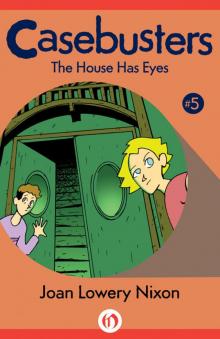 The House Has Eyes
The House Has Eyes The Dark and Deadly Pool
The Dark and Deadly Pool Keeping Secrets
Keeping Secrets Secret, Silent Screams
Secret, Silent Screams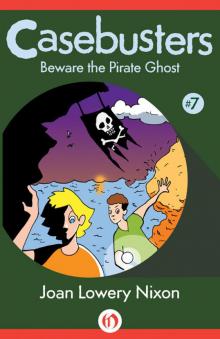 Beware the Pirate Ghost
Beware the Pirate Ghost Search for the Shadowman
Search for the Shadowman Haunted Island
Haunted Island